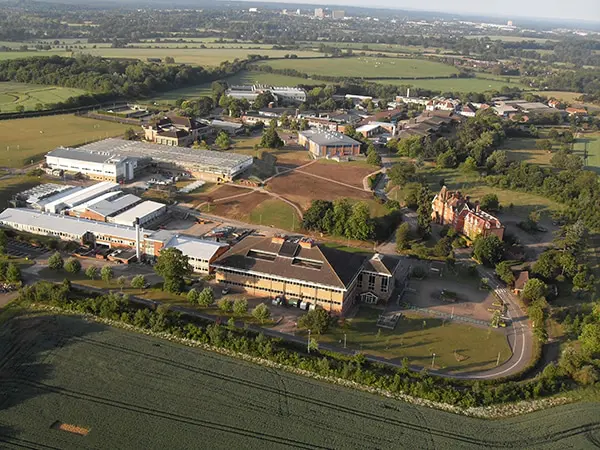Syngenta’s International Research Centre at Jealott’s Hill near Bracknell, in Berkshire, is the company’s largest site for new agrochemical research and development and product support.
Employing nearly 800 scientists and support staff, it is where many of the world’s most important crop protection products have been developed. Key activities include research into the discovery of new active ingredients for crop protection products and ensuring that these are safe to the operator, consumer and the environment.

An aerial view of Syngenta’s International Research Centre at Jealott’s Hill, near Bracknell, Berkshire
Also on site is the biggest glasshouse research complex in Europe, a £8.5 million development covering 4,000 square metres, where scientists carry out research on a wide selection of crops in a range of climatic conditions.
With such a variety of activities, waste management is something which has to be carefully managed and it was a review in 2006 which led Syngenta to streamline operations and bring them all together under one roof with Grundon Waste Management.
Taking a more integrated approach has proved both more effective and efficient, helping the company towards its goal of reducing waste to landfill, improving recycling and recovery, and saving money.
As a result, statistics show that between 2008 and 2013, Syngenta has reduced its waste disposal spend by 30% and increased its recycling rate from 12% to an average of 62%.
A spokesperson for the company said: “Grundon enabled us to bring everything together into what is effectively a ‘one stop shop’, it has meant the waste can be managed and controlled by just one or two people on site.”
Grundon worked with the waste management team at Jealott’s Hill to help them understand how to best process and manage the different types of waste, and optimise the use of containers and storage facilities on site.
All the small changes have added to Syngenta’s overall aim of trying to improve their recycling and recovery and reduce the burden on landfill.
The Grundon contract manager and team have built up a good working relationship with the Jealott’s Hill team and it is now a true partnership which is both open and collaborative.
Typical waste materials vary from general mixed recyclables to office, food and solvent waste, as well as construction where building refurbishment work has been carried out. With a clear emphasis on maximising recycling and recovery and trying to limit the number of waste streams going to landfill, one such success is that food waste, which previously went to landfill, is now collected by Grundon and sent for anaerobic digestion.
Another successful example is the introduction of a solvent recovery process which, after successful trials made a “big impact” and has now been implemented on a regular basis.
Office waste has also been under the spotlight and trials are currently in place to encourage staff to be more selective and segregate the waste they throw away into waste paper bins.
The nature of Syngenta’s business means it often has to dispose of a variety of chemicals, and it calls on the expertise of the qualified chemists in Grundon’s technical team for advice on disposal processes.
Given the diversity of the waste generated, ensuring all the right documentation and audit trails are in place is critical for Syngenta. Grundon takes a very responsible attitude to the treatment of waste, giving our clients great confidence that all the processes meet strict compliance regulations.
Another plus is the fact that Grundon’s network of waste disposal operations across the Thames Valley ensures waste is kept local, helped also by the company’s decision to go CarbonNeutral® across its entire roadgoing vehicle fleet earlier this year, meaning all journeys are not only CarbonNeutral®, but also avoid adding to a customer’s own carbon footprint.
The spokesperson added: “Syngenta has a responsibility to treat the environment with the greatest respect and minimise the environmental impact of our operations, it’s very important to us to keep carbon emissions to a minimum, which is what Grundon enables us to do.”
Monthly review meetings ensure both Syngenta and Grundon teams are up-to-speed with the latest developments in waste management and a mark of the relationship’s success is the fact that Grundon’s services have recently been extended to service Syngenta’s Guildford office.

Comments: 0
No comments yet, why not be the first?